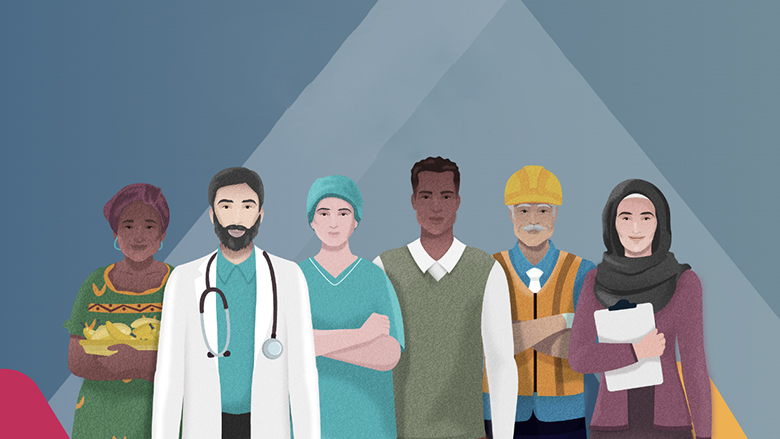PS4R produces knowledge, tools, trainings, diagnostics, and other resources to aid businesses, philantrhopies, governments, and the development community in economically empowering forcibly displaced people while driving host-community growth. This page is a growing hub for those resources, along with select resources developed by others.
Private Sector For Refugees
KNOWLEDGE & TOOLS
Featured
PS4R Knowledge & Tools: Practical Insights and Guidance
-
Refugee Employment: Perspectives for Businesses, Policymakers, and Intermediaries
There are both economic and humanitarian reasons for companies to employ refugees--and employment is critically important for moving them off of humanitarian assistance and on to both self-sufficiency and better lives. This study looks at the reasons and offers guidance for businesses, policymakers, and intermediaries on how to support refugee employment.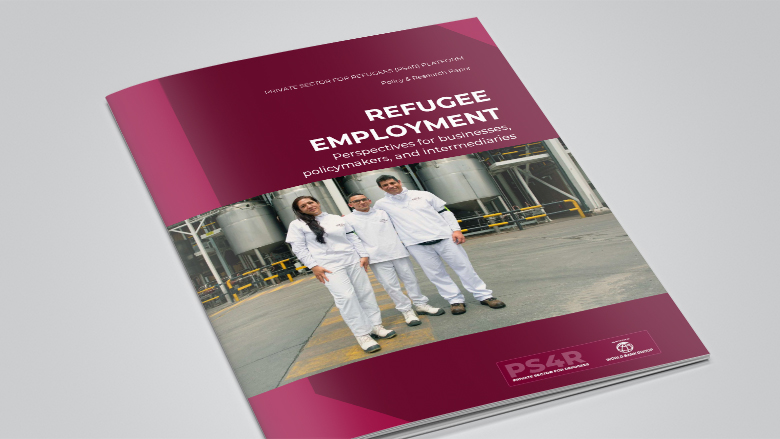
Read More / Download the Report
Advancing Refugee Entrepreneurship: Guidelines for the Private Sector, Governments, and the Development Community
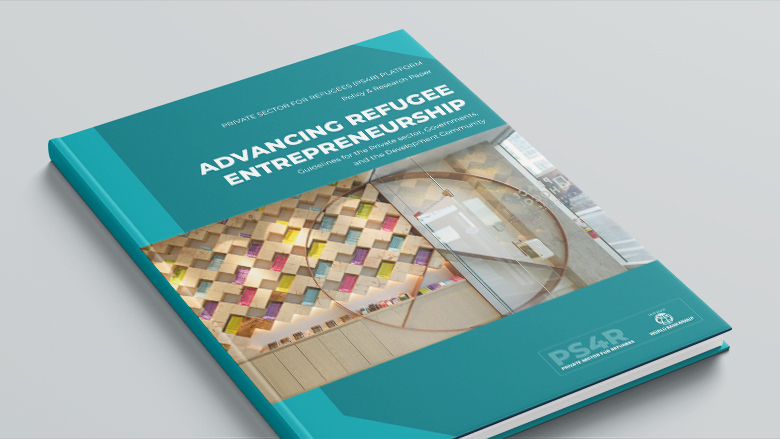
Refugee entrepreneurs create jobs that are badly needed in their communities. An enabling environment is critical to unleash new-business creation. This paper examines the state of refugee entrepreneurship in various world regions and suggests steps the private sector, governments, and the development community can take to support business creation and growth.
Read More / Download the Report
Refugee-Related Investment: Myth or Reality?
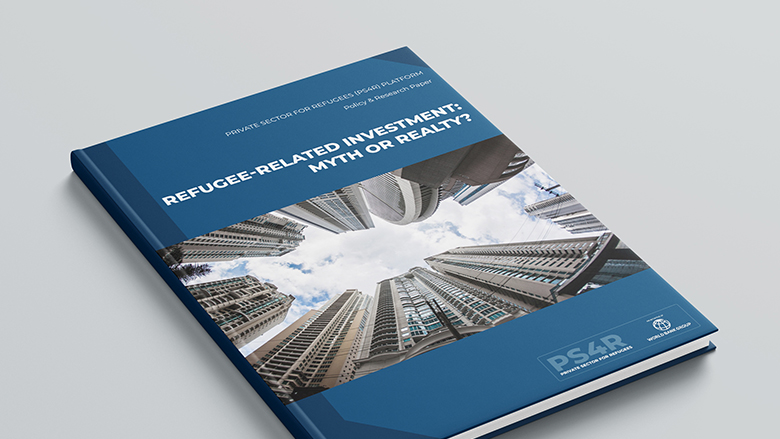
Investing in refugee-related enterprises creates jobs for refugees and expands host-community private sectors. This paper looks at obstacles and opportunities in this still-emerging field.
Read More / Download the Report
Unlocking the Economic Power of Refugees in Central Africa
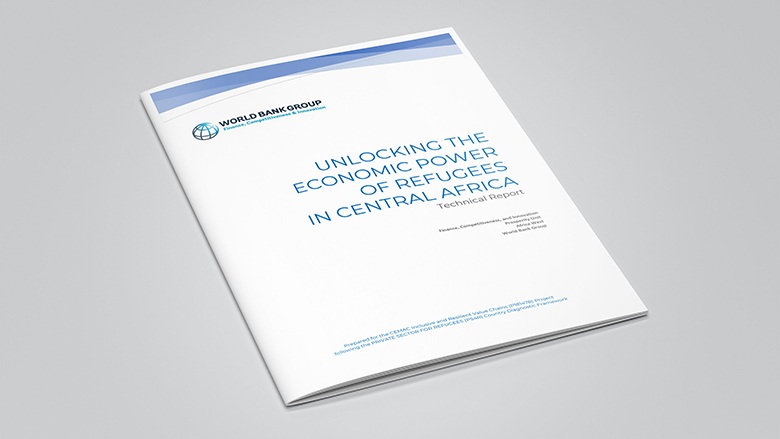
This report explores how inclusive economic strategies can empower refugees across the six CEMAC nations—Cameroon, Chad, the Central African Republic, Gabon, Equatorial Guinea, and the Republic of Congo, emphasizing sustainable integration through entrepreneurship, employment, and investment opportunities within key value chains.
Read More / Download the Report
Economic Empowerment of Forcibly Displaced Persons from Ukraine: Assessment of the Polish Legal and Regulatory Framework and the Role of the Polish Private Sector
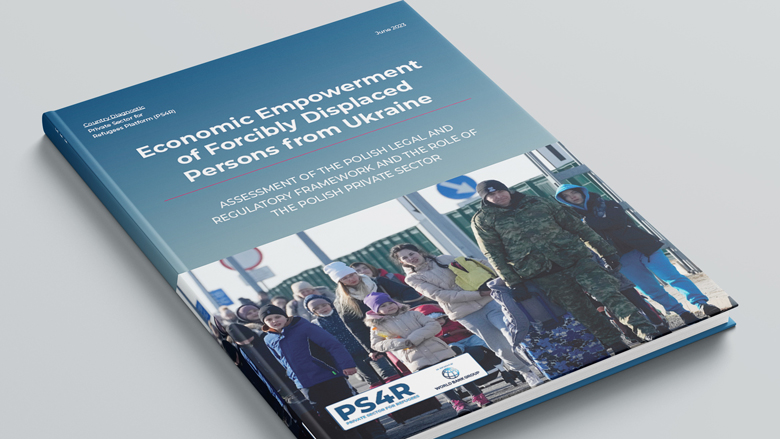
This report argues that the earlier forcibly displaced people from Ukraine are integrated into the Polish economy, the earlier they will integrate into Polish society more broadly and support the development of local communities with their skills, talents, and entrepreneurial activities. With the right regulatory incentives, local practices, and support from the private sector, the forcibly displaced from Ukraine can be employers, enrich the workforce, invest, and become new markets for products and services.
Read More / Download the Report
World Development Report 2023
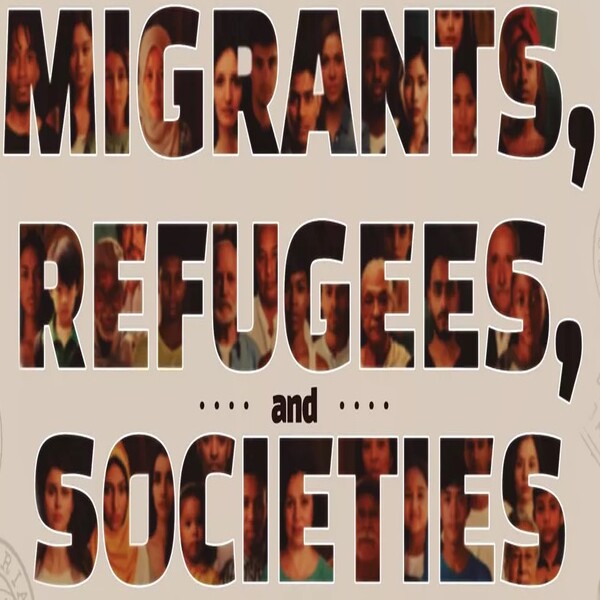
World Development Report 2023 proposes an integrated framework to maximize the development impacts of cross-border movements on both destination and origin countries and on migrants and refugees themselves. the framework offers, drawn from labor economics and international law. Read more.
Download the WDR 2023 Report.
-
E-Learning from PS4R: The Private Sector / Refugees Link

Designed for businesses, the development community, and governments, this online course is available free of charge. It outlines how refugees and other forcibly displaced people can enrich host communities' economies when they become part of
the private sector. This potential is often underestimated or disregarded, as the private sector is rarely aware of the business opportunities that might come from engaging with refugees. The training shows how companies can simultaneously help them realize this potential, help strengthen host-community economies, and realize benefits for themselves in the process.
Charter of Good Practice on the Role of the Private Sector in Economic Integration of Refugees
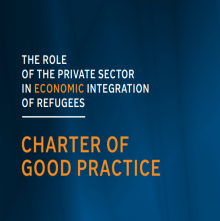
Created in 2019 in collaboration of more than 200 experts and practitioners, the Charter of Good Practice offers actionable guidelines for business on how to integrate FDPs, and for policymakers on how to create strong enabling environments.
Mashreq : Maximizing the Impact of Gender-Lens Investing and Business Practices for Forcibly Displaced Women
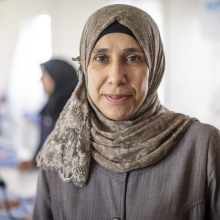
The economic empowerment of forcibly displaced women (FDW) can contribute to greater resilience and improved livelihoods for both displaced people and host communities. The Mashreq Gender Facility (MFG) focuses on mechanisms to support the economic inclusion of forcibly displaced women. This brief from MFG highlights lessons learned from support to on-the ground activities, including actions to adopt a stakeholder-groups approach in investing; boost entrepreneurship; overcome barriers of employment access; provide tailored services and products; create an enabling environment; and generate disaggregated indicators to measure results.
-
PS4R snapshots are quick takes on businesses and other organizations working with forcibly displaced people.
Entrepreneurship
- Mersin Chamber of Commerce and Industry (MCCI): Capacity-Building
- Peace By Chocolate: My Path to Entrepreneurship in Canada, and Building a Purposeful Business
- Singa: Inclusive Entrepreneurship Program With Refugees In Europe
- World Bank And Kakuma Camp: Turning a Refugee Camp into a Marketplace for Investment and Entrepreneurs
- Siba Entrepreneurship And Diaspora Networks: Lessons Learned from Syrian Refugees/Entrepreneurs Globally
- Startup Syria
- ICC-EDF Foundation-UNHCR: Electrification of a Rohingya Refugee Camp
- Bogota Chamber of Commerce: Matching Venezualan Refugees’ Skills and Experiences with Companies’ Needs
- Gaziantep Chamber of Commerce: Support Desk to Empower Syrian Refugees to Become Entrepreneurs
Investment
- IDA Capital/WorqCompany: Small Business Investment in Refugees and Hosts
- KIVA Refugee Investment Fund: Scaling up Investments for Refugees
- Kois: Blended Finance For Refugees
- Open Society Foundation: Catalyzing Investments For The Benefits Of Refugees And Host Communities
- Microfund For Women: Does Microfinance Work For Refugees?
- The Danish Foundation For Social Responsibility Neighborhood Mothers
- Faire: Investing in Refugee Entrepreneurs through a Philanthropic Structure
Employment
- Sameh Group and Jerash Factory: Partnering with Sahab Municipality, Jordan, for Refugee Employment
- UNSTUCK: creating Job Opportunities for Refugees in Supply Chains
- Aukland Business Chamber and Immigration New Zealand: Employment Opportunities for Migrants and Refugees
- NaTakallam: Language Courses and Services bv Refugees and Displaced People
- Classic Fashion Apparel Industry Ltd. Co: Employment Opportunities for Refugees in Jordan
- ISS Services A/S: Why We Hire Refugees, A Company Perspective
- Palliser Furniture: Experiences Working With Refugees In Canada and Mexico – A Learning Journey
- Building And Wood Workers’ International (BWI): Decent Jobs For Syrian Refugees In Lebanon
- Tent Partnership for Refugees: Fostering Refugee Employment
Products and services
- Foresight: Predicting Large-Scale Forced Displacement
- Lifeshelter: Rethinking Refugees in Each Step of the Value Chain
- Grundfos And Danish Refugee Council: Delivering Sustainable Water Solutions in Displacement Settings
- Dinarak: Unleashing Mobile Payments in Jordan
- BNP Paribas: Adapting Financial Services
- Moxey: FinTech Solutions for Unbanked Populations
- Tanda: Financial Products for Refugee Inclusion in Jordan
-
PS4R Investment Roundtable 2021
On June 22, 2021, PS4R partners and collaborators held a roundtable on refugee-related investment. Participants discussed the viability of refugee-related investments.
Download the summary of the proceedings for more details.
PS4R Address and Exhibition at the Paris Peace Forum 2020
On November 12, 2020, PS4R was exhibited at the Paris Peace Forum by way of an address delivered by World Bank Senior Private Sector Specialist Benjamin Herzberg. The address touched on the ways in which companies have adapted their business models to work with refugees, and how international partners are working together to overcome some of the systemic challenges. The event also offered background on the PS4R initiative, the Charter of Good Practice, thematic work, and briefs featured on the PS4R website.
Download the summary of the Paris Peace Forum 2020 for further details.
How the private sector is adapting its work with refugees in the context of Covid-19
On November 10, 2020, the PS4R partners organized an online knowledge event, exploring how the private sector adaptation of its work with refugees in the context of Covid-19. Speakers reflected on their experience and lessons learned; the effect of the pandemic on their operations; and how PS4R could support them moving forward. Speakers came from MasterCard, IOM, the Bogota Chamber of Commerce, TENT, UNHCR France, GroFin, and IFC. A Burundian refugee entrepreneur based in Rwanda also presented. The event featured videos of support from ICC Secretary General John Denton; World Bank Managing Director of Development Policy and Partnerships Mari Pangestu; and UN High Commissioner for Refugees Filippo Grandi.
Download the summary of the PS4R knowledge event for further details.
